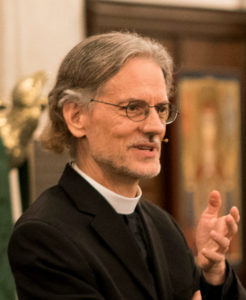Death and AI and Resurrection
A teenager was murdered in a mass shooting at his school in 2018. By 2020, his parents had founded a nonprofit which, among other things, produced a political commercial. The ad opens with an introduction by the parents. Then these words appear on the screen: “We used artificial intelligence to bring [name] back for one last message.” And then the ad shows the boy, speaking: “Yo, it’s me. It’s [name].”
The AI-created teenager goes on to urge people to use their votes to curb gun violence. He notes that, were he still alive, this election would be the first he could vote in. But since his life was cut short by gun violence, he needs the viewers to vote on his behalf.
This story is recounted in “The Speech of the Dead,” an essay by Daniel Walden in the Summer 2023 issue of The New Atlantis. Walden exposes this political ad as another instance of AI crossing over a moral threshold. The dead should be allowed to rest in peace. (For this reason, I have removed the boy’s name here.) It was wrong for the Witch of Endor to summon the prophet Samuel back from the dead. Walden suggests she was a fraud, and her shock is that Samuel really appears. His reading of the Samuel story allows us to see two things: That AI, in this ad, essentially perpetrates a fraud, manipulating the boy’s image and voice to try to persuade the viewer—the persuasion being enhanced by the illusion that the boy is there, speaking. At the same time, AI proposes that we do something we should not, namely, keep alive people who have died.
But why is it, as Walden says, that “the dead must be allowed to rest”? Why is it “that their words in life must remain final”? It is natural for us to want to hang onto someone who has died. Although we must let go of their body, for it is now a corpse—“ashes to ashes, dust to dust”—we do hang onto remembrances: pictures, letters, jewelry, certain articles of clothing. To remember the dead is godly. It shows our respect for them. Yes, it can be overdone—you can hang onto too much stuff, and you can fail to go on in life to do that which God has for you to do. Still, the pious remembrance is appropriate.
Walden refers to (without naming it as such) a sermon Herbert McCabe gave on death. (It is in the book of his sermons, God, Christ, and Us, and was originally given at a Mass in Advent 1986 on BBC TV: https://www.youtube.com/watch?v=tvWzx5eZ88E) McCabe, a Dominican priest, was a brilliant theologian of the last century, one who was able to take the thought of Thomas Aquinas and put it in understandable terms. In this sermon, McCabe says we are right to be angry with God when someone we love dies. This is implicitly different from the feelings we may have when a cat dies. Each cat, of course, is unique, thanks to its genetic inheritance and what has happened to it in life. But there is no sense in which the cat has made itself.
People, by contrast, are to some degree self-made. A teenage boy is unique in part because of his genes and in part because of what has happened to him in the world. But he is also unique because he has a hand in writing his own story. There is more to him than what nature gives. Our anger at the death of a child, a friend, or any other person we know is rooted in this “more,” this sense, as McCabe says, that “in human death nature takes back more than it has lent to us.” Death then is something of a theft. Death steals from us.
Our anger with God over this is (like everything else) first of all God’s gift to us. Just as it is God who moves us to feel gratitude for sunrise and to sorrow for our sins, so God moves us to feel anger over death. He does this because he wants us to feel the longing for resurrection. We hope that God will (in ways we cannot imagine) raise our friend from the dead as a complete human being, in body and soul. Put it this way: God has given us the longing for resurrection, but since we cannot imagine resurrection, it is natural then that this longing in us be expressed in the mode of anger.
Resurrection is not what happened at Endor when Samuel was summoned up. Resurrection is not an AI product. Resurrection is not what the titans of Silicon Valley long for when they try to extend human life to great lengths or even indefinitely. None of these is worth hoping for.
What is worth hoping for is that every human being’s story will be completed. Some of us die in our nineties, some in our fifties, some as teenagers. And—a matter very much on many of our hearts—some of us die before we are born. We have a sense that a nonagenarian meets her death with an almost-complete story, but this is not true. McCabe says that, in truth, all of us die as children. The story of an embryo that never achieves even one ounce of weight is no less complete, and in a sense, no more complete than your story as of today, whoever you are, you who read these words. The resurrection hope is for the fulfilment of what is promised in our being human, which is simply that we will one day become completely so, thus having a complete story.










